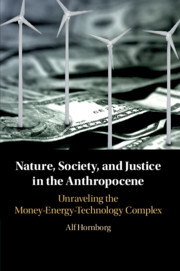Book contents
- Nature, Society, and Justice in the Anthropocene
- New Directions in Sustainability and Society
- Nature, Society, and Justice in the Anthropocene
- Copyright page
- Reviews
- Dedication
- Contents
- Figures
- Acknowledgments
- Introduction
- 1 Rethinking Economy and Technology
- 2 The Anthropocene Challenge to Our Worldview
- 3 Producing and Obscuring Global Injustices
- 4 The Money Game
- 5 Anticipating Degrowth
- 6 The Ontology of Technology
- 7 Energy Technologies as Time–Space Appropriation
- 8 Capitalism, Energy, and the Logic of Money
- 9 Unequal Exchange and Economic Value
- 10 Subjects versus Objects
- 11 Anthropocene Confusions
- 12 Animism, Relationism, and the Ontological Turn
- 13 Conclusions and Possibilities
- Afterword
- References
- Names Index
- Subject Index
7 - Energy Technologies as Time–Space Appropriation
Published online by Cambridge University Press: 24 June 2019
- Nature, Society, and Justice in the Anthropocene
- New Directions in Sustainability and Society
- Nature, Society, and Justice in the Anthropocene
- Copyright page
- Reviews
- Dedication
- Contents
- Figures
- Acknowledgments
- Introduction
- 1 Rethinking Economy and Technology
- 2 The Anthropocene Challenge to Our Worldview
- 3 Producing and Obscuring Global Injustices
- 4 The Money Game
- 5 Anticipating Degrowth
- 6 The Ontology of Technology
- 7 Energy Technologies as Time–Space Appropriation
- 8 Capitalism, Energy, and the Logic of Money
- 9 Unequal Exchange and Economic Value
- 10 Subjects versus Objects
- 11 Anthropocene Confusions
- 12 Animism, Relationism, and the Ontological Turn
- 13 Conclusions and Possibilities
- Afterword
- References
- Names Index
- Subject Index
Summary
To reconceptualize the relation between “power” in the sense of sociopolitical organization and “power” in the sense of energy technologies, we need to unravel the continuities and discontinuities between our concepts of “energy” and “agency.” A delineation of the significance of “agency” is discussed in Chapter 10, where it is observed that so-called posthumanists misleadingly tend to attribute agency to any kind of force, regardless of whether it is propelled by a purpose of some kind. Paradoxically, my critique of the mainstream approach to energy technologies is that it tends to disregard the human agencies underlying their capacity to redistribute workloads and environmental burdens in world society. At first glance, these two objections may seem contradictory, but they are not. In the first case, I disavow the attribution of agency to nonliving forces, while in the latter, I propose that we identify the human agency involved in organizing the unequal access to nonhuman energy. Both arguments challenge conceptual fallacies – either blurring the distinction between the living and the nonliving, or treating technological systems as artifacts purified of human agency – that epitomize the phenomenon of fetishism. In both cases, society is made invisible. In the former case, decontextualized entities are represented as equivalent sources of agency, and the distinction between social and natural is dissolved. In the latter case, the category of “energy” reveals itself to be a politically neutral way of talking about social machinations. Bodily work – muscular energy – is always propelled by agency. When nonmuscular energy is harnessed to substitute for bodily work, there may be sociopolitical agencies at work that are less apparent.
- Type
- Chapter
- Information
- Nature, Society, and Justice in the AnthropoceneUnraveling the Money-Energy-Technology Complex, pp. 114 - 136Publisher: Cambridge University PressPrint publication year: 2019

